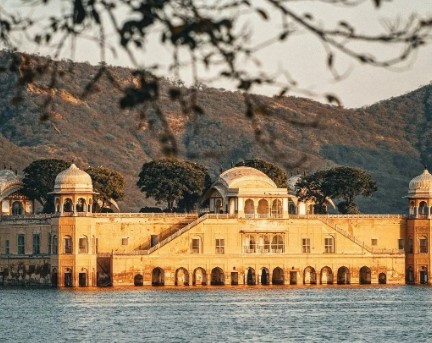Tourism in Rajasthan
Tourism in Rajasthan
👉Tourism is the vital breath in the
human activity while making a prolonged journey from place to place. It is a
human desire to make a sound of the places of interest,i.e. religious,
spiritual, natural phenomenon, beautiful places, monuments, ancient cities and
sites, historical places of pilgrims and above all the places of curiosity.
Tourism may be considered as an organized, purposeful and definite lust to
wander on the part of man. Therefore, human mobility and tourism have been
closely linked since time immemorial.
👉Mobility in various forms, in forms
of period, purpose and place has greatly affected the evolution of human
culture from the automatic and hazardous nomadic to the present day organized,
purposeful and comfortable travels.
👉There is a continuous unfolding of
human civilization. The sense of curiosity to know, to see and to relish that
which lies beyond one’s immediate environs might have been the motive force to
kindle the cupidity for diversity and areal differentiation behind human
wanderings. Before going into the details of the subject matter, it will be
more feasible to define a tourist.
👉Although it is difficult to define a
tourist, yet according to the IUOTO(International Union of Official Travel Organization), 'A tourist is a person travelling for a period of 24 hours or
more in a country other than that in which he usually resides. '
👉According to Brown the Centuary
Dictionary defines a tourist is one who travel for pleasure visiting number
of places to see the scenery sights etc.
👉Ogilivie defines a tourists ‘’Tourists
are not to be despised as consumer of goods..... . It is mainly consumer of
services that they are to be considered and specially of two transport
services.
👉Thus, we can define a tourist "A
tourist is a person who spends money and visits another country for a period of
not less than 24 hours and not more than six months for legitimate,
non-immigrant and certain purpose such as sight-seeing, recreation, sports,
health, study, pilgrimage, business, official duties, conferences, expeditions,
missions, photography, shooting, film-shooting, family reasons and the like.
👉In the modern age of science when
distances are not measured in terms of kilometres but in hours, the length and
breadth of the globe has been wonderfully reduced; industrialization and urbanization cultivated the opprobrium and monotony in the minds of humanity,
the need to understand one another has assumed its great importance; 'Tourism'
says Dr Radhakrishan, 'widens our horizons, promotes understanding, stimulates
travel and fosters Moreover, tourism educates our minds, innovates the
isolation and egotism and provides the first-hand knowledge of different
nations and Today, tourism is an important industry that has opened new
perspectives for Economic empowerment and it makes a very powerful contribution
and strengthens the development of a country's financial resources. Besides,
tourism fetches foreign exchange in the form of invisible export which result
in manifold progress of the nation. Therefore, tourism is a process in which
mutual benefits, material and mental, accumulate.
Geographical Aspects of Tourism
👉Geography and tourism are related to
each other. It was only the stimulus provided by Geography due to which tourism
originated and developed in the world. The curiosity to know what lies beyond
one's own immediate border has its tap roots in Geography. Moreover,
geographical diversity and variety is the base in the nature, planning and
volume of tourist traffic in any country, Tourists generally prefer to visit
those parts of the globe which are characterised by wide vistas both in time
and space.
👉The advertisements in the British
Railways under the caption of Travel to the sunny south attract large because
of their healthy, invigorating and mild climate. The time chosen by tourists
for visiting different parts of the world is again a question of suitability of
seasons. Transportational suitability is largely guided by geographical
panorama, modes and means of travel may vary in the mountains, plateaus, plains,
deserts or snow-clad regions. Although, the modern transportation and
communication have brought about uniformity in travelling modes and regions of
the tour, yet traditional and regional modes of transport continues to have
their hold.
👉Travel industry is largely dependent
on wide and organized publicity. A tourist can only plan his tour if all the
suitable information viz. geographical, economic, transportational,
communicational, accommodational, meteorological and the like from the relevant
agencies are available. Much of these informations can be made available to a
tourist by simple attractive and comprehensive methods supported by maps and
illustrations which needs skilled cartographic work in which geographic
cartography along with commercial art have important contribution to make.
Preparation of maps with route ways punctuate with pictorial representation of
places of tourist's interest is a precondition for the development of the
tourist industry.
Ecological Aspects of Tourism
👉Ecology also plays an important role
in shaping and reshaping the tourist industry in a given area or a country.
Keoladeo Ghana bird sanctuary cannot be developed in a arid land.Bharatpur is
located in the semi-arid climatic region of our country which provides solar
rains,floral wealth, water potentiality, migratory bird route and the place for
their short but sweet stay.
👉Similarly, the simultaneous
upbringing of Tiger, Panther, Deer, and the like (fauna) wild life wealth at
Kanha, Ranthambhor, Sariska National Parks and sanctuary, put forth
ecologically balanced view for the tourist industry to grow. Also, the
availability of the national bird peacock in northern India, Godawan in
Rajasthan, Gir lions in Gujarat and elephants in Assam are again the ecological
aspects of tourism in our country. The diversity of nature, peaceful
co-existence of floral and manual organisms are the pivot of tourist industry.
👉Nature is benign if adjustment is
restored but bewildering if harshfully intervened, unrationally utilized and
illegitimately damaged. If a dam is constructed to beautify the area, attract
the tourists, navigation, fishing, recreation and other purposes without caring
for the siltation, erosion, deforestation, talus creep, land degradation
problems in view, the result will be a painful one, and disastrous. A
conceptual model showing the inter-relationship between various ecological
factors in hill road construction and the resultant eco-imbalance causing
hardships for tourist industry is a point directional.
Thankyou comment your queries below.









0 Comments